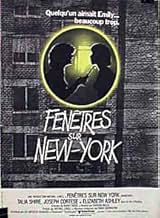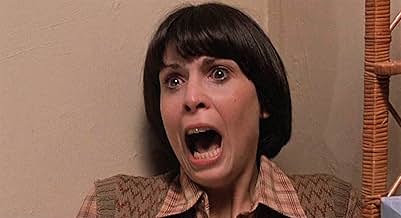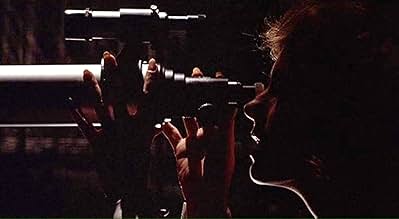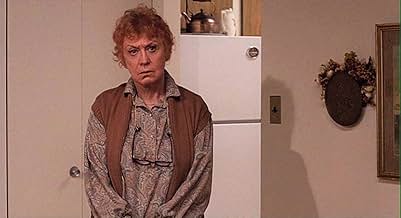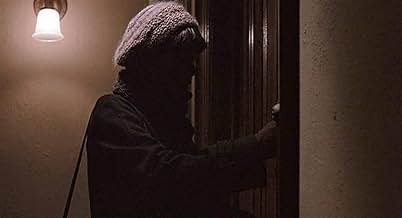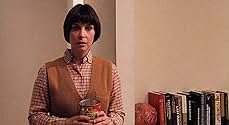IMDb RATING
4.8/10
1.1K
YOUR RATING
A weird woman admires and spies on her shy mousy neighbor with a telescope.A weird woman admires and spies on her shy mousy neighbor with a telescope.A weird woman admires and spies on her shy mousy neighbor with a telescope.
- Awards
- 6 nominations total
Joe Cortese
- Bob Luffrono
- (as Joseph Cortese)
Bette Davis
- Charlotte Vale
- (archive footage)
- Director
- Writer
- All cast & crew
- Production, box office & more at IMDbPro
Featured reviews
Windows (1980)
** (out of 4)
Emily (Talia Shire) walks into her apartment when she is attacked from behind. She is forced onto the ground with a knife where the man threatens to kill her unless she shows him what she has and that she moans in satisfaction so that he can record it. Police detective Luffrono (Joseph Cortese) questions Emily but she has no details of the man. Soon the two of them are striking up a relationship, which doesn't sit well with Emily's former neighbor Andrea (Elizabeth Ashley).
WINDOWS is a film that I heard about decades ago when movies like SINGLE WHITE FEMALE and THE HAND THAT ROCKS THE CRADLE were making big cash at the box office. It seems WINDOWS was pretty much forgotten for the most part yet I always wanted to see it even with the rather negative reviews that it got. I must admit that the film wasn't very good and in fact it's pretty silly when viewed today. The film attempts to be a psychological study of two troubled women but in the end it's basically about a lesbian who can't tell another woman she wants her.
It's interesting that this same year also gave us CRUISING. That film was highly controversial and perhaps so much so that this film got away with the idea that a woman could be a nut simply because she was a lesbian and wants another woman. Instead of telling her she orders the woman to be sexually attacked and then she begins to stalk her. All of this should have made for a more interesting film but sadly WINDOWS just never really takes off. The biggest problem is the screenplay, which tries to avoid any real violence or anything all that dramatic and instead we just see the two women as they discuss their situations with the men in their lives. Emily has her cop friend and Andrea has her shrink.
I'm not going to sit here and say that the movie doesn't have any good qualities because it does. Shire was very good in her role, although the screenplay doesn't give her too much to do except to act scared at times and at other times to stutter. She's still quite good as the fragile woman as is Ashley, although she's given even less to do. The real standout was Cortese who was excellent in the role of the detective. The film does benefit from some nice cinematography and the New York City locations were great.
Some people might find the subject disturbing and some might find the film to be creepy but neither really worked on me. The film is mildly entertaining but it never has any real suspense and that's its real downfall. Gordon Willis was a wonderful cinematographer but it's easy to see why he never really blossomed as a director. The lack of any real energy or suspense kills the film and you just keep waiting for it to take off but it never does.
** (out of 4)
Emily (Talia Shire) walks into her apartment when she is attacked from behind. She is forced onto the ground with a knife where the man threatens to kill her unless she shows him what she has and that she moans in satisfaction so that he can record it. Police detective Luffrono (Joseph Cortese) questions Emily but she has no details of the man. Soon the two of them are striking up a relationship, which doesn't sit well with Emily's former neighbor Andrea (Elizabeth Ashley).
WINDOWS is a film that I heard about decades ago when movies like SINGLE WHITE FEMALE and THE HAND THAT ROCKS THE CRADLE were making big cash at the box office. It seems WINDOWS was pretty much forgotten for the most part yet I always wanted to see it even with the rather negative reviews that it got. I must admit that the film wasn't very good and in fact it's pretty silly when viewed today. The film attempts to be a psychological study of two troubled women but in the end it's basically about a lesbian who can't tell another woman she wants her.
It's interesting that this same year also gave us CRUISING. That film was highly controversial and perhaps so much so that this film got away with the idea that a woman could be a nut simply because she was a lesbian and wants another woman. Instead of telling her she orders the woman to be sexually attacked and then she begins to stalk her. All of this should have made for a more interesting film but sadly WINDOWS just never really takes off. The biggest problem is the screenplay, which tries to avoid any real violence or anything all that dramatic and instead we just see the two women as they discuss their situations with the men in their lives. Emily has her cop friend and Andrea has her shrink.
I'm not going to sit here and say that the movie doesn't have any good qualities because it does. Shire was very good in her role, although the screenplay doesn't give her too much to do except to act scared at times and at other times to stutter. She's still quite good as the fragile woman as is Ashley, although she's given even less to do. The real standout was Cortese who was excellent in the role of the detective. The film does benefit from some nice cinematography and the New York City locations were great.
Some people might find the subject disturbing and some might find the film to be creepy but neither really worked on me. The film is mildly entertaining but it never has any real suspense and that's its real downfall. Gordon Willis was a wonderful cinematographer but it's easy to see why he never really blossomed as a director. The lack of any real energy or suspense kills the film and you just keep waiting for it to take off but it never does.
This is one of those flicks I've wanted to see since it came out (I was underage at the time). The plot just sounded very freaky and bizarre. Regardless, it is one of the THE most impossible films to find since I don't believe it got a video release (except overseas) and I don't even think it played on cable in the '80s. It is however on YouTube now :-).
This film gets trashed by a lot of people immediately as being non-PC and homophobic. I think that's more a signpost of when the film was released, when attitudes toward people with other orientations weren't so enlightened.
No, the core problem behind this picture is that it's just a raving, stinking mess, and it really is virtually all Willis' fault. When you read the opening credits, your jaw drops...they read like an A-list of movie greats: Morricone, Bourne, Willis as DP. How could they screw this up? Easy. A) Don't build any suspense; B) Don't establish any characters or motivations; C) Allow the writer to write any damn thing he wants to, no matter how stupid or no matter what expense to the actors; D) Resort to constant dissolves when you don't know what else to do, especially since there is virtually no coherent action; E) Don't direct your actors...after all they're pros, they know exactly what to do. The list goes on....
This is a stalker movie....it should be about stalking. There is absolutely no fear built, no tension. It's a real master class in wasted celluloid.
Still, part of me has to admire this in a way you sometimes admire any bad movie. It sure didn't have any self-censoring going on. it did what it wanted to do and took no prisoners. One of the many things that makes it a museum piece today, even if that museum is a wax one.
This film gets trashed by a lot of people immediately as being non-PC and homophobic. I think that's more a signpost of when the film was released, when attitudes toward people with other orientations weren't so enlightened.
No, the core problem behind this picture is that it's just a raving, stinking mess, and it really is virtually all Willis' fault. When you read the opening credits, your jaw drops...they read like an A-list of movie greats: Morricone, Bourne, Willis as DP. How could they screw this up? Easy. A) Don't build any suspense; B) Don't establish any characters or motivations; C) Allow the writer to write any damn thing he wants to, no matter how stupid or no matter what expense to the actors; D) Resort to constant dissolves when you don't know what else to do, especially since there is virtually no coherent action; E) Don't direct your actors...after all they're pros, they know exactly what to do. The list goes on....
This is a stalker movie....it should be about stalking. There is absolutely no fear built, no tension. It's a real master class in wasted celluloid.
Still, part of me has to admire this in a way you sometimes admire any bad movie. It sure didn't have any self-censoring going on. it did what it wanted to do and took no prisoners. One of the many things that makes it a museum piece today, even if that museum is a wax one.
I've read the user reviews for this film, and some of them seem way too harsh. I understand Windows was critically bashed during its theatrical release and considered offensive to many viewers, but watching it today, it's not that bad. In fact, keeping an open mind as to how the characters interact with one another, it's at the very least interesting. Sure, there are plot holes the size of Manhattan, but this is a stylized thriller with beautiful photography at its core.
The story centers on a psycho named Andrea (Elizabeth Ashley) – who just happens to be a lesbian – infatuated with her timid neighbor Emily (Talia Shire). Andrea goes so far as to hire a creep named Obecny (Rick Petrucelli) to attack Emily and have the ordeal recorded. Andrea gets her kicks listening to the audio despite seeing a therapist. We soon learn that curing Andrea of her obsession may not be in the cards. What follows is Emily trying to cope and get on with her life while Andrea basically stalks and watches her through a telescope.
The film does drag a bit at times, but the climax certainly holds its own until the very end, where it just fizzles. However, I did scratch my head a couple of times in a good way by being perplexed as to what the intentions of the characters were. I also thought Ashley gave an unusual performance. Andrea was played as confused and sometimes volcanic, but with more subtlety, unlike an Alex Forrest (Fatal Attraction), for example. I think she should have been the focus of the film, giving Ashley more to work with and to create a deeper connection to the material. The acting was credible by the rest of the cast, especially Shire, who warms up to the role as the film progresses. Finally, the whole controversy over Andrea being a lesbian seems silly now. I mean, it's a character. We have all kinds of movies featuring different types of psychopaths relishing in various fetishes. Andrea just happened to be a lesbian whose obvious crush was going to be on another woman. Let's get over it already.
I wanted to see this film for over 30 years because of the controversy it spawned. Was it worth it? Yes and no. I didn't see it as controversial, but it did keep me watching until the end. Just watch the Syfy channel, and you'll see WAY more movies worse than this one in every respect, literally. If you do decide to see Windows, don't overanalyze it and remember this was the first and only directorial effort from the renowned cinematographer Gordon Willis.
The story centers on a psycho named Andrea (Elizabeth Ashley) – who just happens to be a lesbian – infatuated with her timid neighbor Emily (Talia Shire). Andrea goes so far as to hire a creep named Obecny (Rick Petrucelli) to attack Emily and have the ordeal recorded. Andrea gets her kicks listening to the audio despite seeing a therapist. We soon learn that curing Andrea of her obsession may not be in the cards. What follows is Emily trying to cope and get on with her life while Andrea basically stalks and watches her through a telescope.
The film does drag a bit at times, but the climax certainly holds its own until the very end, where it just fizzles. However, I did scratch my head a couple of times in a good way by being perplexed as to what the intentions of the characters were. I also thought Ashley gave an unusual performance. Andrea was played as confused and sometimes volcanic, but with more subtlety, unlike an Alex Forrest (Fatal Attraction), for example. I think she should have been the focus of the film, giving Ashley more to work with and to create a deeper connection to the material. The acting was credible by the rest of the cast, especially Shire, who warms up to the role as the film progresses. Finally, the whole controversy over Andrea being a lesbian seems silly now. I mean, it's a character. We have all kinds of movies featuring different types of psychopaths relishing in various fetishes. Andrea just happened to be a lesbian whose obvious crush was going to be on another woman. Let's get over it already.
I wanted to see this film for over 30 years because of the controversy it spawned. Was it worth it? Yes and no. I didn't see it as controversial, but it did keep me watching until the end. Just watch the Syfy channel, and you'll see WAY more movies worse than this one in every respect, literally. If you do decide to see Windows, don't overanalyze it and remember this was the first and only directorial effort from the renowned cinematographer Gordon Willis.
"Windows" was directed by noted cinematographer (and frequent Woody Allen collaborator) Gordon Willis, and as one would expect, he has a great eye for artful compositions, creative use of light / shadow, and New York. The film is (nearly) always visually interesting, which helps sustain it through a rather thin story. Elizabeth Ashley is both touching and unsettling, but Talia Shire seemed to have already been typecast into the mousy, "Rocky's wife" type of roles. Trivia: apparently in 1979 you could rent an apartment in Brooklyn Heights for $300 a month!! **1/2 out of 4.
WINDOWS reminds me of REFLECTIONS IN A GOLDEN EYE. When REFLECTIONS came out in 1967, it had the book thrown at it for being deviant, sick, perverse, reactionary, offensive, pretentious (which is such a mouthful that it makes one believe that the hater(s)doth protest too much). On top of these epithets, was the final body blow, and "just plain boring." It's difficult to be all of the above and be "just plain boring" to boot which is the reason I was compelled to check out both movies. I'm glad I did. WINDOWS is not the outright triumph REFLECTIONS IN A GOLDEN EYE is, but it's thoughtful and original about something that shouldn't be dismissed by film lovers out of court. It's not sleazy or exploitative; as a matter of fact, that's a major problem with it. It refuses to further sensationalize its wildly lurid "givens." It's artful enough in its intentions to try to suggest that the tragedy of urban life is not the violence of melodramatic evil, but the glass cubicles people live in that link and separate them in devastatingly emotional ways. Gordon Willis' direction is typical of a first time director. It suffers from being too studied but it's far from daft or moronic; visually, it's as thought through as REAR WINDOW, its obvious predecessor in voyeurism. But there's nothing in REAR WINDOW, as seriously naked and exposed as Elizabeth Ashley's performance. It's interesting that when great actors like Brando (in REFLECTIONS IN A GOLDEN EYE), and Ashley in WINDOWS attempt something that goes beyond the average viewer's opinion of how a homosexual SHOULD be portrayed, there's is an automatic reflex action on the part of said viewer to distance themselves from the performance, to laugh at it or automatically dismiss it as being "over the top." This response is, in fact, more reactionary than the sins that have been dumped in the picture's lap. WINDOWS is not as dumb or insensitive as the knee jerk response it provokes in most people who feign an interest in the dark side until it becomes too real.
Did you know
- TriviaReleased in theaters roughly one month before Cruising (1980), another film that was protested by gay rights activists for portrayals some deemed homophobic and hateful stereotypes.
- Quotes
Andrea Glassen: Please... don't hurt me. Please... don't hurt me. *Please*... don't hurt me. Please... don't hurt me. Don't hurt me. Please. Please. Please don't hurt me. Please don't hurt me. Please don't hurt me. Please don't hurt me. Please.
- Alternate versionsUK cinema and video versions were heavily cut by 2 minutes 16 secs by the BBFC to edit the opening rape scene.
- How long is Windows?Powered by Alexa
Details
- Release date
- Country of origin
- Language
- Also known as
- Corky
- Filming locations
- 9 Cranberry Street, Brooklyn Heights, Brooklyn, New York City, New York, USA(Emily and Andrea's first apartment building)
- Production company
- See more company credits at IMDbPro
Box office
- Gross US & Canada
- $2,128,395
- Opening weekend US & Canada
- $311,796
- Jan 20, 1980
- Gross worldwide
- $2,128,395
Contribute to this page
Suggest an edit or add missing content



